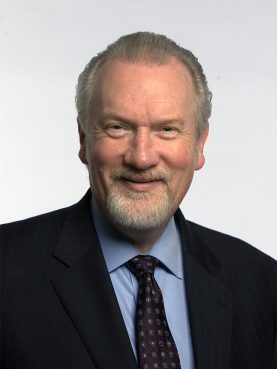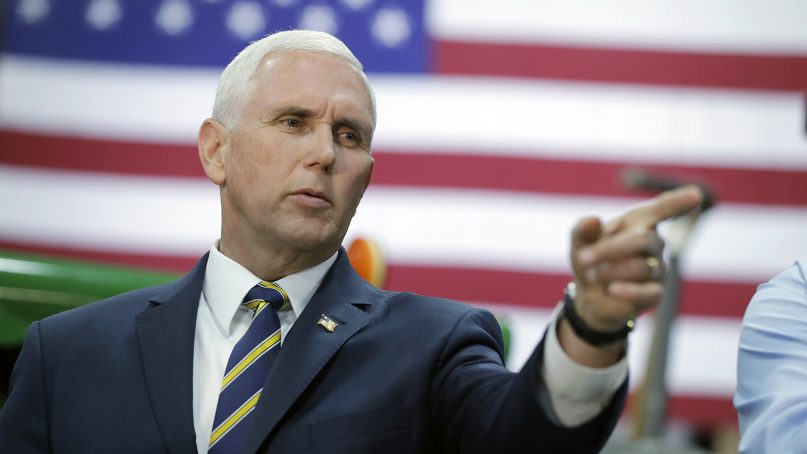(RNS) — Taylor University, an evangelical Christian college in Upland, Ind., has invited Mike Pence to be its 2019 commencement speaker.
Not everyone in the Taylor community is happy about it.
The debate over the vice president’s visit to Taylor reveals a lot about the way evangelical colleges are choosing to navigate America’s changing religious landscape.
Alumni who oppose Pence’s visit to Taylor have started a Change.org petition claiming that the invitation makes “our alumni, faculty, staff and current students complicit in the Trump-Pence Administration policies, which we believe are not consistent with the Christian ethic of love we hold dear.”
Taylor University faculty expressed their dissent to the Pence invitation by a vote of 61-49.
This is not the first time in recent memory that the Taylor community has divided over politics. Back in March 2018, several disgruntled Taylor employees started an underground newspaper with a mission to expose what they believed to be Taylor’s move in a “liberal direction.”
At the time, Taylor President Lowell Haines condemned the anonymous publishers for “sow(ing) discord and distrust” and “hurting members of our community.”
Some Americans who hold progressive views on sex and marriage — whether they are Christian or not — are going to condemn Taylor for inviting Pence because, among other things, he holds a conservative position on marriage and has recently mixed it up with gay presidential candidate and South Bend Mayor Pete Buttigieg.
But this kind of criticism lacks nuance. Most evangelical schools have traditional positions on marriage and believe that homosexual practice is unbiblical.
Progressives are going to need to deal with the fact that a significant portion of the United States population shares Pence’s views in the area of sexual ethics.
I hope they will see the need to work with evangelicals to cultivate a more inclusive and pluralistic society where deeply held religious beliefs on sexual ethics are respected. Unfortunately, both Pence and many progressives seem unwilling to tackle such a project, preferring instead to dig in their heels and continue to lob grenades in the culture war.
The real issue here is not Taylor’s right to be an orthodox Christian university on issues of marriage and sexual ethics, but rather Pence’s unyielding support for Donald Trump.
The vice president has stood behind a president who is a liar, has paid hush money to an adult film star, has faced dozens of charges of sexual harassment, has separated children from families at the Mexican border, disrespects American institutions, boasts of his materialism, understands religious liberty as something that only pertains to his evangelical base, seems incapable of seeing anything beyond himself, inspires white supremacists and has generally governed our country with no moral core.
Pence has defended or remained silent about nearly everything Trump has done. The president has used him as a pawn to win white evangelicals and keep them in the fold.

Lowell Haines. Photo courtesy of Taylor University
One can be fully on board with campuses inviting all kinds of people, of all kinds of political persuasions, to speak to students, but a commencement address is different. Commencement speakers at Christian colleges send a message — to graduating seniors, to alumni, to parents, to donors and to the larger community — about the values a school holds dear.
Commencement is a time to celebrate a Christian college’s mission. Does Pence, the chief water carrier for Trump, represent Taylor University’s mission?
It is ironic that Haines, who decried “discord” back in March 2018, has decided to invite Pence. Haines must know that many in the evangelical community, most of his own faculty and many of his students see Pence as a morally problematic figure. Haines had to expect that such an invitation would divide the Taylor students, faculty and alumni base. Yet he invited Pence anyway.
Haines and his staff will now spend the next several years trying to heal a self-inflicted wound on campus.
Or maybe Haines and his staff are fully aware of the fact that the choice of a commencement speaker sends a message about the things that a Christian college values. Perhaps this is exactly why he invited Pence.
Christian colleges are faced with difficult choices in these days of divisiveness and fear.
One type of Christian college will defend Christian orthodoxy (yes, even in the area of marriage), respect the civil rights of all Americans (including those in the LGBTQ community), support creative solutions designed to defend religious liberty in a pluralist society, welcome the stranger, respond to the culture with a posture of hope and pursue the common good. This type will not feel the need to promote or defend the policies of the White House.
Another type of Christian college, which seems exemplified best by Jerry Falwell Jr.’s Liberty University (Pence will also speak at its commencement this spring), will defend orthodoxy, reject creative attempts to defend religious liberty in a pluralist society and support (at least at the level of the administration) the anti-Christian policies of Trump.
As I wrote in a 2017 op-ed in The Washington Post, we are starting to see some significant realignments in American evangelicalism.
(John Fea teaches history at Messiah College in Mechanicsburg, Pa. He is the author of “Believe Me: The Evangelical Road to Donald Trump.” The views expressed in this commentary do not necessarily represent those of Religion News Service.)





